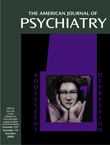Preliminary Evidence of Improved Verbal Working Memory Performance and Normalization of Task-Related Frontal Lobe Activation in Schizophrenia Following Cognitive Exercises
Abstract
OBJECTIVE: The authors’ goal was to evaluate the possibility of treating brain and behavioral aspects of verbal memory dysfunction in patients with schizophrenia through cognitive exercises. METHOD: Eight patients did daily verbal memory exercises that became progressively more difficult over a 10-week training period. Memory performance and regional brain activations during a verbal memory task were assessed before and after these exercises. RESULTS: Verbal but not nonverbal memory performance improved after training; three patients made substantial gains, and five showed little change. Performance gains were correlated with increases in task-related activation of the left inferior frontal cortex. One patient given 5 extra weeks of training 6 weeks after the initial training period showed maintenance of initial performance gains 6 weeks after training, further improvement after the second period of training, and normalization of task-related activation of the left inferior frontal cortex. CONCLUSIONS: Verbal memory deficits can be ameliorated by memory exercises in some patients with schizophrenia. Performance improvements are associated with increased task-related activation of the same brain region that is activated during verbal memory tasks in healthy individuals.



